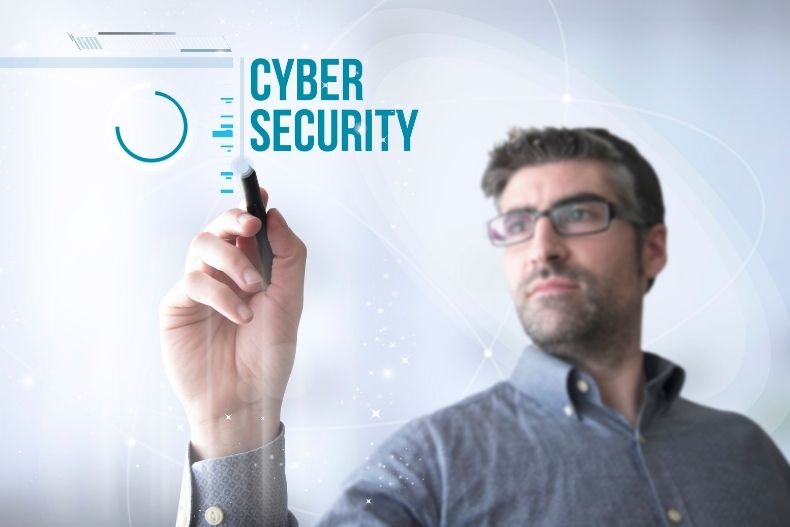Running a business today will often require using the internet to generate leads and fulfill services. In running a business this way, you will usually have a team working remotely or using company systems to accomplish their goals. After spending considerable time devising a business plan, securing funding, coming up with a product, hiring exceptional employees, and launching, the last thing you’ve probably thought about is cybersecurity. But rest assured that cybersecurity is a significant concern in the world today. With over 47% of businesses experiencing breaches, attacks, hacks, and other threats throughout the last few years, it only makes sense that you should reinforce cyber security standards in your organization.

Firewall
The first stop on your cybersecurity journey should be a firewall. Simply put, firewalls protect computers from unauthorized access. They’re good at blocking malicious traffic or viruses before reaching your system and work well with antivirus programs. Businesses can also use them to prevent employees from accessing unauthorized content while working or potentially compromising your company’s data at the office. With a firewall in place, there’s less potential for data loss and risk while maintaining the Integrity of your operational systems.
Maximum Security Software
In addition to a firewall, you’ll probably want to use a suite of maximum security software to bolster your online protection. It’s ideal for home, business, and mobile use, making it a multifaceted——and easy to implement—cybersecurity solution. Top security software protects you from online scams, performs regular scans, and helps prevent viruses from infiltrating your system. Furthermore, such software can handle financial transactions, making them safer and more secure. Avoiding potential scams while your employees work online is crucial. Blocking various web threats (no one wants a drive-by download or a successful phishing attempt to ruin their day) should be at the top of your mind these days, so it makes sense to leverage whatever resources you can toward that cause.
VPN
When browsing the internet at home, shopping, or hanging out on social media, you probably aren’t thinking a lot about how you’re tracked online. But, tracking what you’re doing online and collecting your data happens. Although your internet service provider isn’t supposed to do it (based on GDPR), that doesn’t mean your data is private online. That’s why VPNs or virtual private networks are growing in popularity lately. A VPN reroutes traffic through different servers located around the world. As the traffic moves through these servers, it becomes encrypted, protecting you from third-party attackers. This protection effectively creates a private and safe browsing experience that works well when integrated with other security measures. With a VPN, you can browse quickly, not have to worry about bandwidth throttling on the part of your ISP, and even access geo-blocked content that might not otherwise be available in your area. A VPN also makes it safe to use public Wi-Fi or unsecured connections in cafes/restaurants. It effectively creates a private browsing experience with encrypted data that is difficult to compromise.
Investing in a VPN 2FA is a smart and advanced way to stay ahead of the curve when it comes to protecting your VPN access. This two-factor authentication provides an additional layer of defense against malicious actors looking to get access to sensitive information. With its robust encryption capabilities, VPN 2FA is a secure system that can help protect your customers’ data and your company’s reputation. Two-factor authentication is becoming increasingly important in today’s digital world, making it something you don’t want to overlook when it comes to keeping your business safe. If you have a corporate Fortigate VPN, then it is time to enable Fortigate Two Factor Authentication to boost your business operations.
Strong Passwords and MFA
For most of us, passwords can be significant pain. Long and distinct passwords can be challenging to remember and challenging to devise. But it doesn’t have to be that way. Follow a few simple password best practices to generate secure passwords/passphrases. It could be as simple as making a 12-character password with a blend of uppercase and lowercase letters, numbers, and symbols. Avoid basing your passwords on personal information or something that can be readily identifiable. That’s a surefire way to allow hackers to crack them. It’s also wise to use different passwords for every system. Complexity is vital for passwords, and they should not be easy to guess. It’s also possible to use a password manager (something likely included in a maximum security program suite) to securely keep all of your passwords in a single place and attached them to a master password to access them. After instituting a robust password policy, you should also consider requiring employees to use multi-factor authentication when logging into any business system. In multi-factor authentication, you can use an app, security questions, email, or phone number to create an additional layer of security for logging into business-critical programs.
Backup Plans
To protect yourself from the myriad threats that roam the internet, you need an antivirus and firewall at the minimum. But it’s also wise to have a backup plan. Since you’re running a business that will very likely accumulate customer data, you need to keep that data safe and all of your pertinent business data. To do so, you need to make regular backups of your systems. Backups are crucial if you get attacked by ransomware because recovering from such an attack is impossible in most situations. It’s prudent to adopt a 3-2-1 backup policy. This process is where you make one primary copy of the data with two backup copies. The two copies should be on two different types of storage mediums, and organizations should store one of them off-site. Taking some precautions on top of your other cybersecurity methods will lead to a safer use of your systems by employees and clients alike for a long time to come.